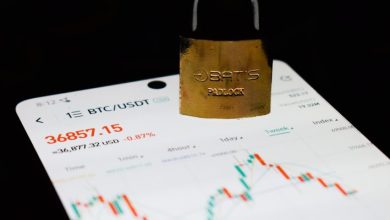Chainlink (LINK): The Role of Oracles in Blockchain

- Understanding the importance of oracles in the blockchain ecosystem
- Exploring how Chainlink facilitates data transfer between blockchains and external sources
- The role of Chainlink in ensuring accurate and secure data feeds for smart contracts
- How Chainlink’s decentralized oracle network enhances the reliability of blockchain applications
- The impact of Chainlink’s technology on the future of decentralized finance (DeFi)
- Challenges and opportunities in the integration of oracles like Chainlink into blockchain systems
Understanding the importance of oracles in the blockchain ecosystem
Oracles play a crucial role in the blockchain ecosystem by acting as the bridge between off-chain data and smart contracts. They are essential for enabling blockchain platforms to interact with real-world data such as price feeds, weather conditions, and other external information that cannot be verified on the blockchain itself.
Without oracles, smart contracts would be limited to only processing data that is available on the blockchain, severely restricting their use cases. By providing a way to securely and reliably fetch external data, oracles significantly expand the capabilities of blockchain technology and unlock a wide range of possibilities for decentralized applications.
Chainlink is a decentralized oracle network that has gained significant attention in the blockchain space due to its ability to connect smart contracts with real-world data in a secure and decentralized manner. By leveraging a network of nodes to retrieve and verify off-chain data, Chainlink ensures the integrity and accuracy of the information that smart contracts rely on to execute their functions.
Understanding the importance of oracles in the blockchain ecosystem is crucial for realizing the full potential of decentralized applications. By facilitating the seamless integration of external data into smart contracts, oracles like Chainlink play a vital role in enabling the development of innovative solutions across various industries, from finance to supply chain management and beyond.
Exploring how Chainlink facilitates data transfer between blockchains and external sources
Chainlink plays a crucial role in enabling the transfer of data between different blockchains and external sources. Oracles act as the intermediary that fetches data from off-chain sources and delivers it to smart contracts on the blockchain. This process helps smart contracts access real-world data, making them more versatile and applicable in various scenarios.
By utilizing Chainlink’s decentralized oracle network, developers can securely integrate external data into their blockchain applications. This capability opens up a wide range of possibilities for industries such as finance, insurance, supply chain, and gaming. The decentralized nature of Chainlink ensures data integrity and reliability, as multiple oracles are involved in the data delivery process.
Chainlink’s architecture allows for seamless connectivity between blockchains and external systems, enhancing interoperability and expanding the use cases of blockchain technology. Through its robust infrastructure and network of oracles, Chainlink facilitates the exchange of information in a secure and efficient manner, bridging the gap between on-chain and off-chain data sources.
The role of Chainlink in ensuring accurate and secure data feeds for smart contracts
Chainlink plays a crucial role in ensuring the accuracy and security of data feeds for smart contracts. Oracles, such as Chainlink, act as a bridge between blockchain platforms and external data sources. They retrieve real-world data and feed it into smart contracts, enabling them to execute based on real-time information.
One of the key benefits of Chainlink is its decentralized nature. By tapping into a network of independent node operators, Chainlink can source data from multiple providers, ensuring reliability and preventing a single point of failure. This decentralized approach enhances the security and trustworthiness of data feeds, making smart contracts more robust and resistant to manipulation.
Moreover, Chainlink’s use of cryptographic proofs, such as zero-knowledge proofs, ensures the integrity of data throughout the entire process. This means that data cannot be tampered with or altered without detection, further bolstering the accuracy and reliability of smart contract executions.
By leveraging Chainlink’s robust infrastructure and decentralized network, developers can confidently build smart contracts that rely on accurate and secure data feeds. This not only enhances the functionality of blockchain applications but also opens up new possibilities for industries such as finance, insurance, and supply chain management. In essence, Chainlink plays a vital role in driving the adoption and success of smart contracts in the blockchain ecosystem.
How Chainlink’s decentralized oracle network enhances the reliability of blockchain applications
The decentralized oracle network provided by Chainlink plays a crucial role in enhancing the reliability of blockchain applications. Oracles act as bridges between blockchains and external data sources, ensuring that smart contracts can access real-world information in a secure and trustless manner. By enabling smart contracts to interact with off-chain data, Chainlink significantly expands the capabilities of blockchain technology.
One of the key benefits of Chainlink’s decentralized oracle network is its ability to prevent single points of failure. Traditional centralized oracles are vulnerable to manipulation or downtime, which can compromise the integrity of smart contracts. In contrast, Chainlink’s decentralized network leverages multiple independent node operators to source and validate data, reducing the risk of data manipulation and ensuring high availability.
Furthermore, Chainlink’s reputation system incentivizes node operators to provide accurate data by rewarding them with LINK tokens. This mechanism helps maintain data integrity and reliability, as node operators have a financial incentive to act honestly. Additionally, Chainlink’s decentralized architecture ensures that no single party has control over the data inputs, further enhancing the security and trustworthiness of blockchain applications.
Overall, Chainlink’s decentralized oracle network enhances the reliability of blockchain applications by providing a secure and decentralized mechanism for accessing off-chain data. By leveraging multiple independent node operators, a reputation system, and a decentralized architecture, Chainlink helps ensure that smart contracts can securely interact with real-world data, unlocking new possibilities for blockchain technology.
The impact of Chainlink’s technology on the future of decentralized finance (DeFi)
Chainlink’s innovative technology has had a profound impact on the future of decentralized finance (DeFi). By providing a reliable and secure way to connect smart contracts with external data sources, Chainlink’s oracles play a crucial role in ensuring the accuracy and reliability of data used in DeFi applications.
One of the key benefits of Chainlink’s technology is its ability to bring real-world data onto the blockchain in a trustless manner. This opens up a world of possibilities for DeFi applications, allowing them to access a wide range of data sources, including price feeds, weather data, and more.
Chainlink’s decentralized oracle network also helps to mitigate the risks associated with centralized oracles, which can be vulnerable to manipulation or downtime. By distributing data retrieval and aggregation across multiple nodes, Chainlink ensures that the data used in DeFi applications is tamper-proof and reliable.
Overall, Chainlink’s technology is revolutionizing the DeFi space by providing a secure and reliable way to connect smart contracts with external data sources. As the DeFi ecosystem continues to grow, Chainlink’s role as a trusted oracle solution will only become more important in ensuring the integrity and security of decentralized applications.
Challenges and opportunities in the integration of oracles like Chainlink into blockchain systems
When considering the integration of oracles like Chainlink into blockchain systems, there are several challenges and opportunities that arise. One of the main challenges is ensuring the security and reliability of the data provided by the oracles. This is crucial in maintaining the integrity of the blockchain network and preventing any potential vulnerabilities. However, by implementing robust security measures and protocols, these challenges can be effectively mitigated.
Another challenge is the potential centralization of oracles, which goes against the decentralized nature of blockchain technology. To address this, developers can explore decentralized oracle networks to distribute data from multiple oracles, ensuring a more secure and reliable source of information. This approach not only enhances the decentralization of the blockchain system but also improves its overall resilience.
On the other hand, integrating oracles like Chainlink into blockchain systems presents numerous opportunities. By leveraging external data sources through oracles, blockchain applications can access real-world information, enabling a wide range of new use cases and functionalities. This opens up possibilities for smart contracts to interact with external systems, such as IoT devices or financial markets, expanding the capabilities of blockchain technology.
Furthermore, the integration of oracles can enhance the scalability of blockchain systems by offloading certain tasks to external sources. This can help reduce the burden on the blockchain network and improve its overall performance. Additionally, oracles can facilitate interoperability between different blockchains by enabling them to exchange data seamlessly, fostering a more connected and integrated blockchain ecosystem.
Overall, the integration of oracles like Chainlink into blockchain systems presents both challenges and opportunities. By addressing security concerns and exploring decentralized solutions, developers can unlock the full potential of oracles in enhancing the functionality and efficiency of blockchain technology.



